Reflection Report: Analyzing Presentation Skills Using Gibbs' Model
VerifiedAdded on 2023/01/06
|8
|2146
|37
Report
AI Summary
This report provides a detailed analysis of a student's presentation experience using Gibbs' Model of Reflection. The report begins with an introduction to reflective models and their importance in learning from experiences. The main body applies Gibbs' six-stage reflective cycle to the student's presentation, describing the situation, feelings, evaluation, analysis, conclusion, and action plan. The student reflects on their nervousness, communication challenges, and teamwork aspects. The evaluation identifies strengths in research and ICT skills but weaknesses in communication and teamwork. The analysis highlights the impact of communication skills, teamwork, and time management. The conclusion suggests areas for improvement, emphasizing the need for practice and teamwork. The action plan outlines steps to build communication skills, increase confidence, and improve presentation skills. The report demonstrates the student's self-assessment of their presentation, providing insights into the areas that need improvement and steps to achieve better results in future presentations.
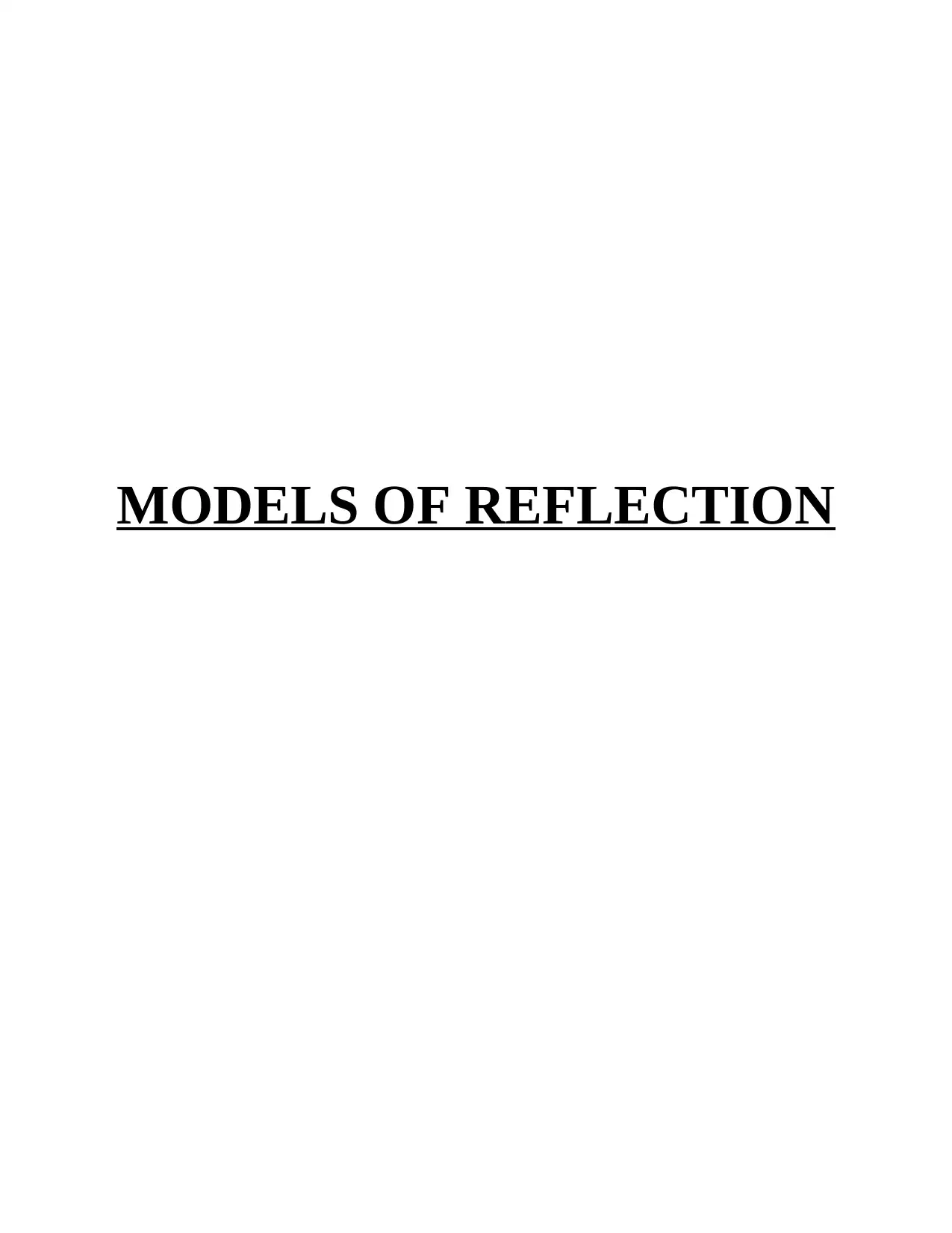
MODELS OF REFLECTION
Paraphrase This Document
Need a fresh take? Get an instant paraphrase of this document with our AI Paraphraser
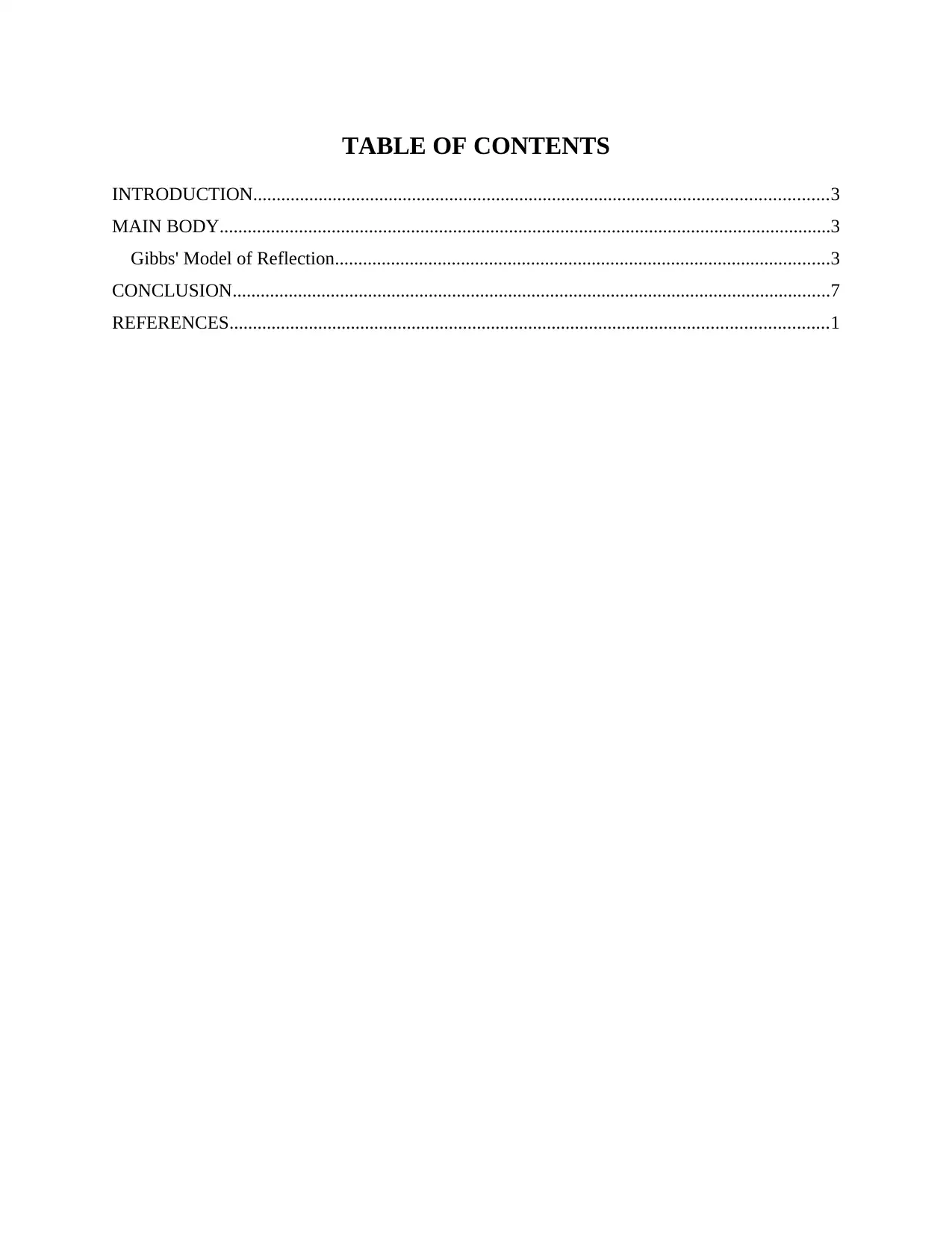
TABLE OF CONTENTS
INTRODUCTION...........................................................................................................................3
MAIN BODY...................................................................................................................................3
Gibbs' Model of Reflection..........................................................................................................3
CONCLUSION................................................................................................................................7
REFERENCES................................................................................................................................1
INTRODUCTION...........................................................................................................................3
MAIN BODY...................................................................................................................................3
Gibbs' Model of Reflection..........................................................................................................3
CONCLUSION................................................................................................................................7
REFERENCES................................................................................................................................1
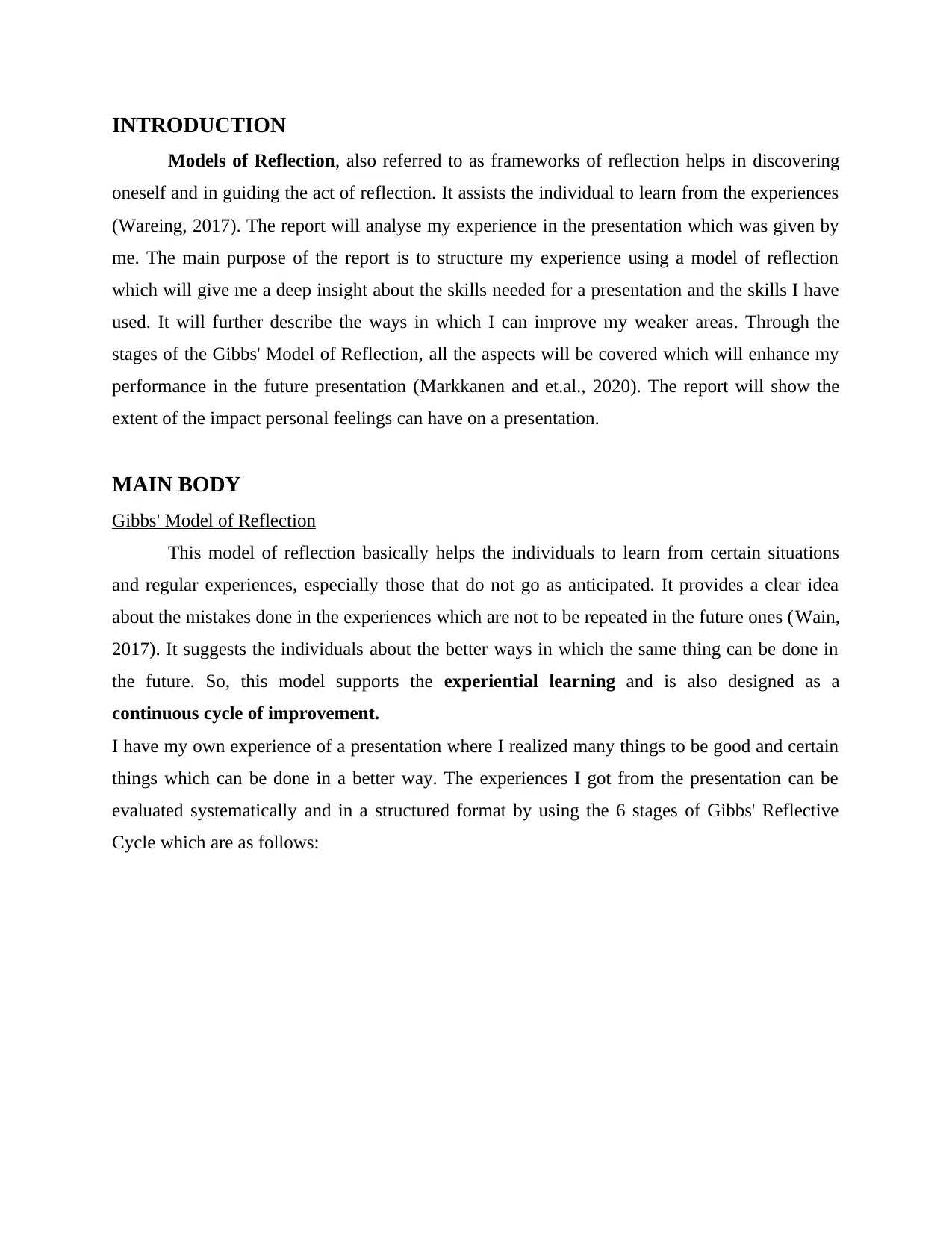
INTRODUCTION
Models of Reflection, also referred to as frameworks of reflection helps in discovering
oneself and in guiding the act of reflection. It assists the individual to learn from the experiences
(Wareing, 2017). The report will analyse my experience in the presentation which was given by
me. The main purpose of the report is to structure my experience using a model of reflection
which will give me a deep insight about the skills needed for a presentation and the skills I have
used. It will further describe the ways in which I can improve my weaker areas. Through the
stages of the Gibbs' Model of Reflection, all the aspects will be covered which will enhance my
performance in the future presentation (Markkanen and et.al., 2020). The report will show the
extent of the impact personal feelings can have on a presentation.
MAIN BODY
Gibbs' Model of Reflection
This model of reflection basically helps the individuals to learn from certain situations
and regular experiences, especially those that do not go as anticipated. It provides a clear idea
about the mistakes done in the experiences which are not to be repeated in the future ones (Wain,
2017). It suggests the individuals about the better ways in which the same thing can be done in
the future. So, this model supports the experiential learning and is also designed as a
continuous cycle of improvement.
I have my own experience of a presentation where I realized many things to be good and certain
things which can be done in a better way. The experiences I got from the presentation can be
evaluated systematically and in a structured format by using the 6 stages of Gibbs' Reflective
Cycle which are as follows:
Models of Reflection, also referred to as frameworks of reflection helps in discovering
oneself and in guiding the act of reflection. It assists the individual to learn from the experiences
(Wareing, 2017). The report will analyse my experience in the presentation which was given by
me. The main purpose of the report is to structure my experience using a model of reflection
which will give me a deep insight about the skills needed for a presentation and the skills I have
used. It will further describe the ways in which I can improve my weaker areas. Through the
stages of the Gibbs' Model of Reflection, all the aspects will be covered which will enhance my
performance in the future presentation (Markkanen and et.al., 2020). The report will show the
extent of the impact personal feelings can have on a presentation.
MAIN BODY
Gibbs' Model of Reflection
This model of reflection basically helps the individuals to learn from certain situations
and regular experiences, especially those that do not go as anticipated. It provides a clear idea
about the mistakes done in the experiences which are not to be repeated in the future ones (Wain,
2017). It suggests the individuals about the better ways in which the same thing can be done in
the future. So, this model supports the experiential learning and is also designed as a
continuous cycle of improvement.
I have my own experience of a presentation where I realized many things to be good and certain
things which can be done in a better way. The experiences I got from the presentation can be
evaluated systematically and in a structured format by using the 6 stages of Gibbs' Reflective
Cycle which are as follows:
⊘ This is a preview!⊘
Do you want full access?
Subscribe today to unlock all pages.

Trusted by 1+ million students worldwide
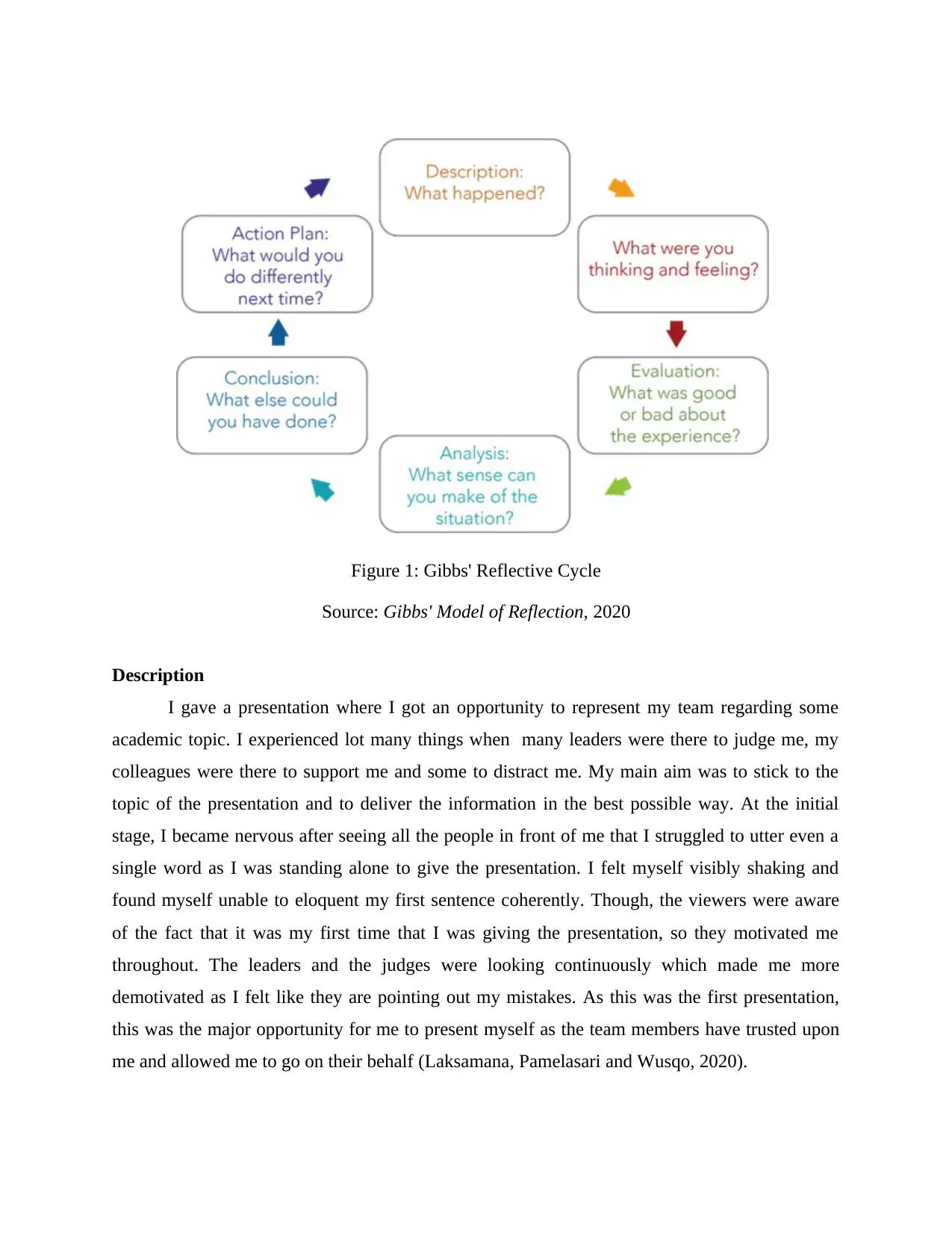
Description
I gave a presentation where I got an opportunity to represent my team regarding some
academic topic. I experienced lot many things when many leaders were there to judge me, my
colleagues were there to support me and some to distract me. My main aim was to stick to the
topic of the presentation and to deliver the information in the best possible way. At the initial
stage, I became nervous after seeing all the people in front of me that I struggled to utter even a
single word as I was standing alone to give the presentation. I felt myself visibly shaking and
found myself unable to eloquent my first sentence coherently. Though, the viewers were aware
of the fact that it was my first time that I was giving the presentation, so they motivated me
throughout. The leaders and the judges were looking continuously which made me more
demotivated as I felt like they are pointing out my mistakes. As this was the first presentation,
this was the major opportunity for me to present myself as the team members have trusted upon
me and allowed me to go on their behalf (Laksamana, Pamelasari and Wusqo, 2020).
Figure 1: Gibbs' Reflective Cycle
Source: Gibbs' Model of Reflection, 2020
I gave a presentation where I got an opportunity to represent my team regarding some
academic topic. I experienced lot many things when many leaders were there to judge me, my
colleagues were there to support me and some to distract me. My main aim was to stick to the
topic of the presentation and to deliver the information in the best possible way. At the initial
stage, I became nervous after seeing all the people in front of me that I struggled to utter even a
single word as I was standing alone to give the presentation. I felt myself visibly shaking and
found myself unable to eloquent my first sentence coherently. Though, the viewers were aware
of the fact that it was my first time that I was giving the presentation, so they motivated me
throughout. The leaders and the judges were looking continuously which made me more
demotivated as I felt like they are pointing out my mistakes. As this was the first presentation,
this was the major opportunity for me to present myself as the team members have trusted upon
me and allowed me to go on their behalf (Laksamana, Pamelasari and Wusqo, 2020).
Figure 1: Gibbs' Reflective Cycle
Source: Gibbs' Model of Reflection, 2020
Paraphrase This Document
Need a fresh take? Get an instant paraphrase of this document with our AI Paraphraser
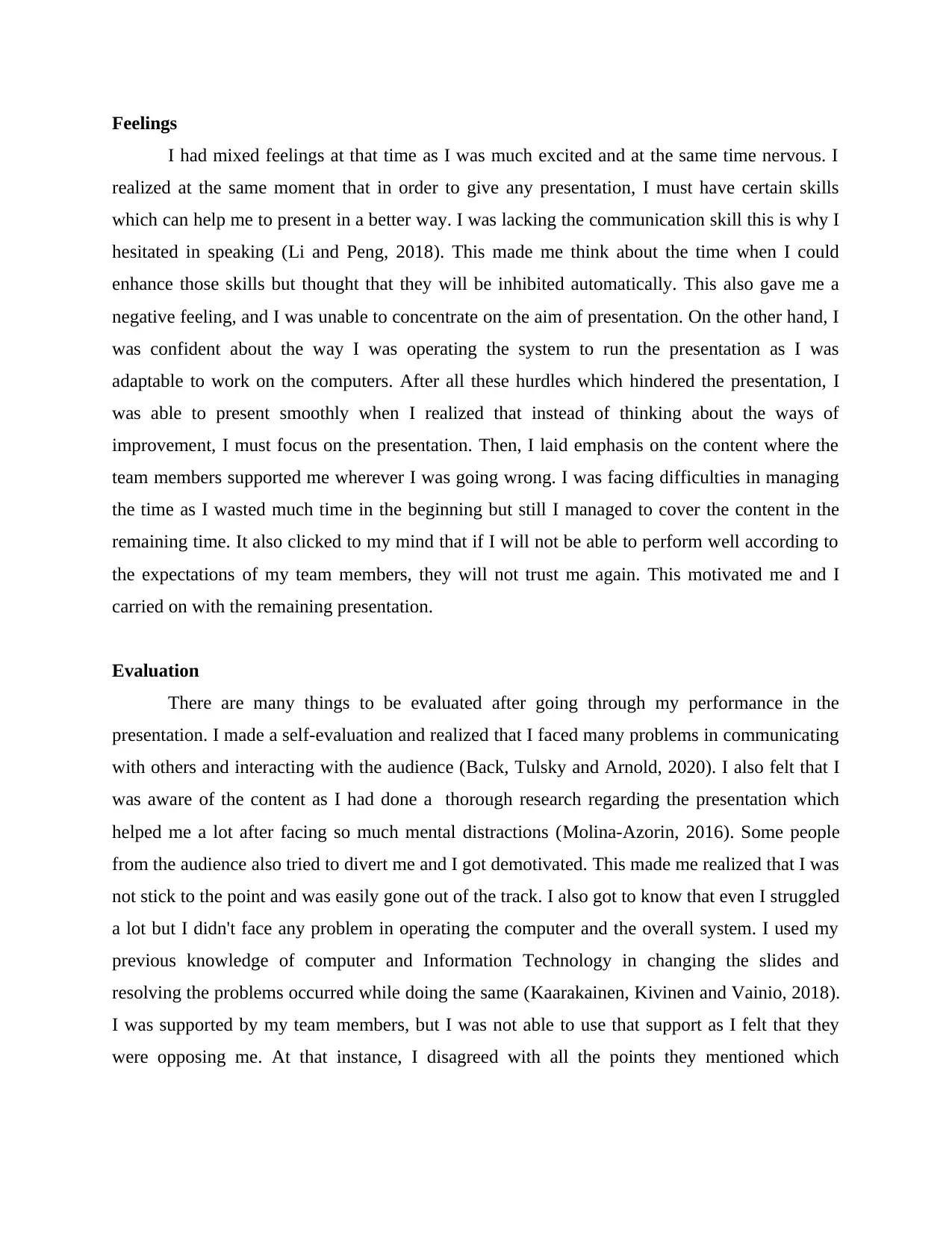
Feelings
I had mixed feelings at that time as I was much excited and at the same time nervous. I
realized at the same moment that in order to give any presentation, I must have certain skills
which can help me to present in a better way. I was lacking the communication skill this is why I
hesitated in speaking (Li and Peng, 2018). This made me think about the time when I could
enhance those skills but thought that they will be inhibited automatically. This also gave me a
negative feeling, and I was unable to concentrate on the aim of presentation. On the other hand, I
was confident about the way I was operating the system to run the presentation as I was
adaptable to work on the computers. After all these hurdles which hindered the presentation, I
was able to present smoothly when I realized that instead of thinking about the ways of
improvement, I must focus on the presentation. Then, I laid emphasis on the content where the
team members supported me wherever I was going wrong. I was facing difficulties in managing
the time as I wasted much time in the beginning but still I managed to cover the content in the
remaining time. It also clicked to my mind that if I will not be able to perform well according to
the expectations of my team members, they will not trust me again. This motivated me and I
carried on with the remaining presentation.
Evaluation
There are many things to be evaluated after going through my performance in the
presentation. I made a self-evaluation and realized that I faced many problems in communicating
with others and interacting with the audience (Back, Tulsky and Arnold, 2020). I also felt that I
was aware of the content as I had done a thorough research regarding the presentation which
helped me a lot after facing so much mental distractions (Molina-Azorin, 2016). Some people
from the audience also tried to divert me and I got demotivated. This made me realized that I was
not stick to the point and was easily gone out of the track. I also got to know that even I struggled
a lot but I didn't face any problem in operating the computer and the overall system. I used my
previous knowledge of computer and Information Technology in changing the slides and
resolving the problems occurred while doing the same (Kaarakainen, Kivinen and Vainio, 2018).
I was supported by my team members, but I was not able to use that support as I felt that they
were opposing me. At that instance, I disagreed with all the points they mentioned which
I had mixed feelings at that time as I was much excited and at the same time nervous. I
realized at the same moment that in order to give any presentation, I must have certain skills
which can help me to present in a better way. I was lacking the communication skill this is why I
hesitated in speaking (Li and Peng, 2018). This made me think about the time when I could
enhance those skills but thought that they will be inhibited automatically. This also gave me a
negative feeling, and I was unable to concentrate on the aim of presentation. On the other hand, I
was confident about the way I was operating the system to run the presentation as I was
adaptable to work on the computers. After all these hurdles which hindered the presentation, I
was able to present smoothly when I realized that instead of thinking about the ways of
improvement, I must focus on the presentation. Then, I laid emphasis on the content where the
team members supported me wherever I was going wrong. I was facing difficulties in managing
the time as I wasted much time in the beginning but still I managed to cover the content in the
remaining time. It also clicked to my mind that if I will not be able to perform well according to
the expectations of my team members, they will not trust me again. This motivated me and I
carried on with the remaining presentation.
Evaluation
There are many things to be evaluated after going through my performance in the
presentation. I made a self-evaluation and realized that I faced many problems in communicating
with others and interacting with the audience (Back, Tulsky and Arnold, 2020). I also felt that I
was aware of the content as I had done a thorough research regarding the presentation which
helped me a lot after facing so much mental distractions (Molina-Azorin, 2016). Some people
from the audience also tried to divert me and I got demotivated. This made me realized that I was
not stick to the point and was easily gone out of the track. I also got to know that even I struggled
a lot but I didn't face any problem in operating the computer and the overall system. I used my
previous knowledge of computer and Information Technology in changing the slides and
resolving the problems occurred while doing the same (Kaarakainen, Kivinen and Vainio, 2018).
I was supported by my team members, but I was not able to use that support as I felt that they
were opposing me. At that instance, I disagreed with all the points they mentioned which
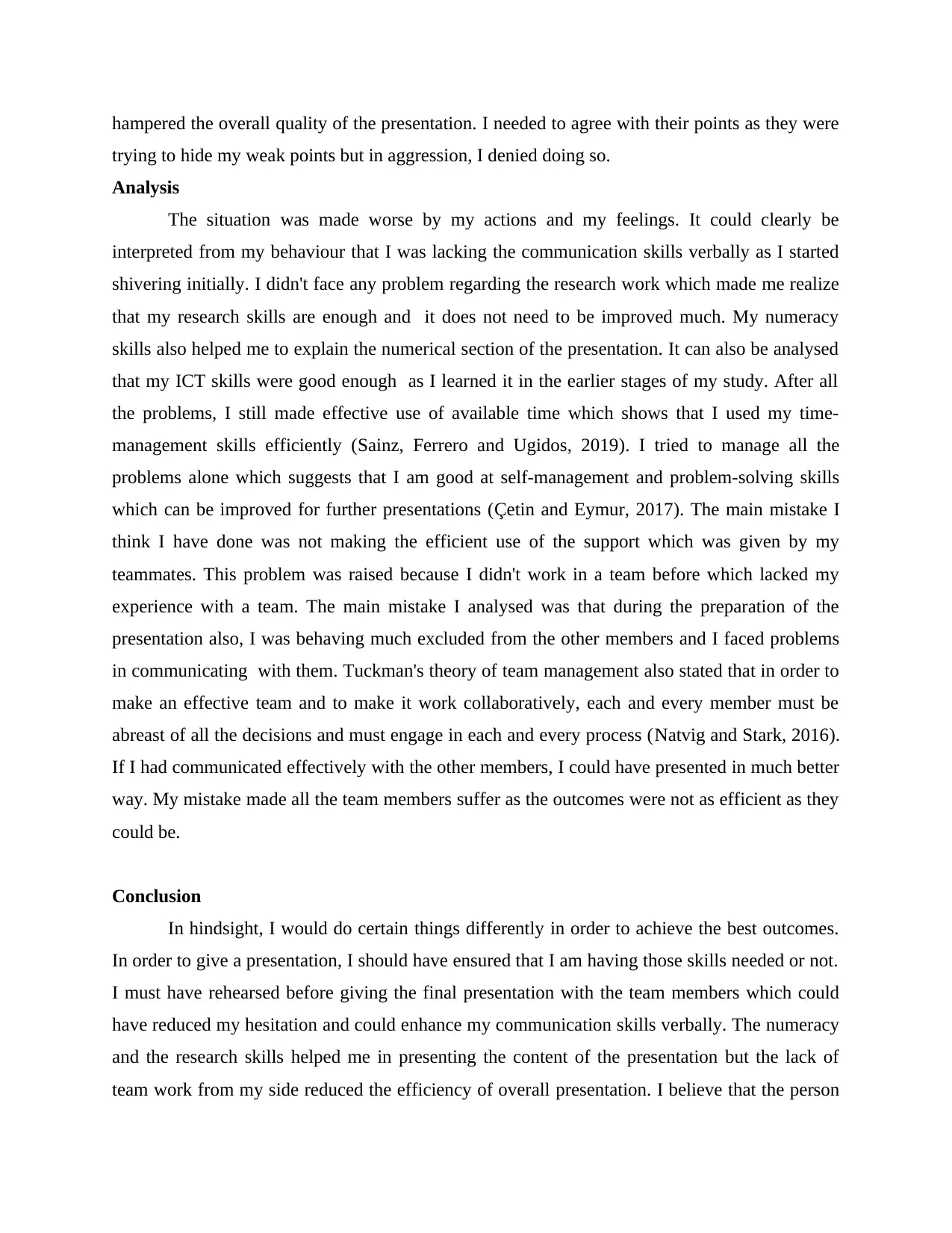
hampered the overall quality of the presentation. I needed to agree with their points as they were
trying to hide my weak points but in aggression, I denied doing so.
Analysis
The situation was made worse by my actions and my feelings. It could clearly be
interpreted from my behaviour that I was lacking the communication skills verbally as I started
shivering initially. I didn't face any problem regarding the research work which made me realize
that my research skills are enough and it does not need to be improved much. My numeracy
skills also helped me to explain the numerical section of the presentation. It can also be analysed
that my ICT skills were good enough as I learned it in the earlier stages of my study. After all
the problems, I still made effective use of available time which shows that I used my time-
management skills efficiently (Sainz, Ferrero and Ugidos, 2019). I tried to manage all the
problems alone which suggests that I am good at self-management and problem-solving skills
which can be improved for further presentations (Ç etin and Eymur, 2017 ). The main mistake I
think I have done was not making the efficient use of the support which was given by my
teammates. This problem was raised because I didn't work in a team before which lacked my
experience with a team. The main mistake I analysed was that during the preparation of the
presentation also, I was behaving much excluded from the other members and I faced problems
in communicating with them. Tuckman's theory of team management also stated that in order to
make an effective team and to make it work collaboratively, each and every member must be
abreast of all the decisions and must engage in each and every process (Natvig and Stark, 2016).
If I had communicated effectively with the other members, I could have presented in much better
way. My mistake made all the team members suffer as the outcomes were not as efficient as they
could be.
Conclusion
In hindsight, I would do certain things differently in order to achieve the best outcomes.
In order to give a presentation, I should have ensured that I am having those skills needed or not.
I must have rehearsed before giving the final presentation with the team members which could
have reduced my hesitation and could enhance my communication skills verbally. The numeracy
and the research skills helped me in presenting the content of the presentation but the lack of
team work from my side reduced the efficiency of overall presentation. I believe that the person
trying to hide my weak points but in aggression, I denied doing so.
Analysis
The situation was made worse by my actions and my feelings. It could clearly be
interpreted from my behaviour that I was lacking the communication skills verbally as I started
shivering initially. I didn't face any problem regarding the research work which made me realize
that my research skills are enough and it does not need to be improved much. My numeracy
skills also helped me to explain the numerical section of the presentation. It can also be analysed
that my ICT skills were good enough as I learned it in the earlier stages of my study. After all
the problems, I still made effective use of available time which shows that I used my time-
management skills efficiently (Sainz, Ferrero and Ugidos, 2019). I tried to manage all the
problems alone which suggests that I am good at self-management and problem-solving skills
which can be improved for further presentations (Ç etin and Eymur, 2017 ). The main mistake I
think I have done was not making the efficient use of the support which was given by my
teammates. This problem was raised because I didn't work in a team before which lacked my
experience with a team. The main mistake I analysed was that during the preparation of the
presentation also, I was behaving much excluded from the other members and I faced problems
in communicating with them. Tuckman's theory of team management also stated that in order to
make an effective team and to make it work collaboratively, each and every member must be
abreast of all the decisions and must engage in each and every process (Natvig and Stark, 2016).
If I had communicated effectively with the other members, I could have presented in much better
way. My mistake made all the team members suffer as the outcomes were not as efficient as they
could be.
Conclusion
In hindsight, I would do certain things differently in order to achieve the best outcomes.
In order to give a presentation, I should have ensured that I am having those skills needed or not.
I must have rehearsed before giving the final presentation with the team members which could
have reduced my hesitation and could enhance my communication skills verbally. The numeracy
and the research skills helped me in presenting the content of the presentation but the lack of
team work from my side reduced the efficiency of overall presentation. I believe that the person
⊘ This is a preview!⊘
Do you want full access?
Subscribe today to unlock all pages.

Trusted by 1+ million students worldwide
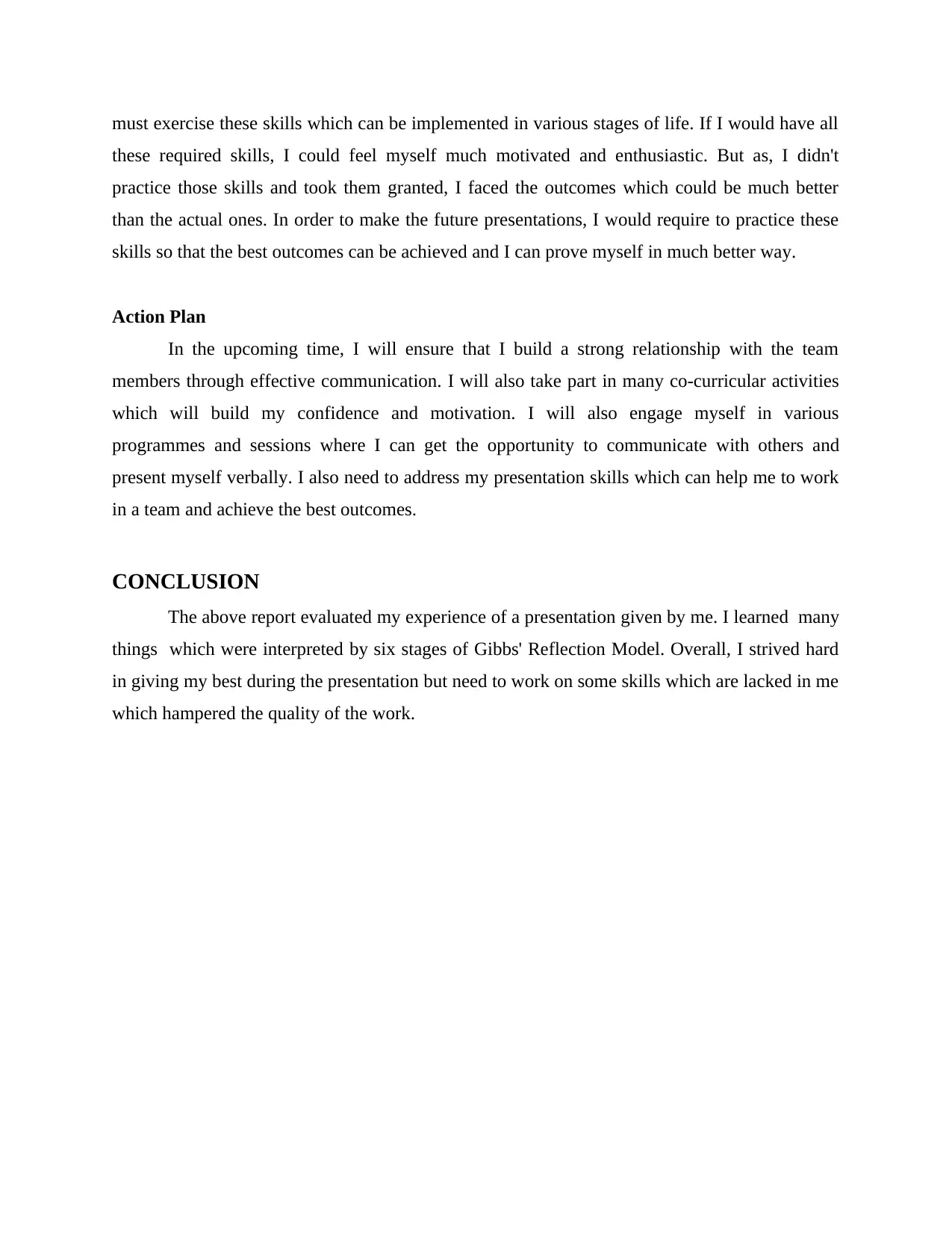
must exercise these skills which can be implemented in various stages of life. If I would have all
these required skills, I could feel myself much motivated and enthusiastic. But as, I didn't
practice those skills and took them granted, I faced the outcomes which could be much better
than the actual ones. In order to make the future presentations, I would require to practice these
skills so that the best outcomes can be achieved and I can prove myself in much better way.
Action Plan
In the upcoming time, I will ensure that I build a strong relationship with the team
members through effective communication. I will also take part in many co-curricular activities
which will build my confidence and motivation. I will also engage myself in various
programmes and sessions where I can get the opportunity to communicate with others and
present myself verbally. I also need to address my presentation skills which can help me to work
in a team and achieve the best outcomes.
CONCLUSION
The above report evaluated my experience of a presentation given by me. I learned many
things which were interpreted by six stages of Gibbs' Reflection Model. Overall, I strived hard
in giving my best during the presentation but need to work on some skills which are lacked in me
which hampered the quality of the work.
these required skills, I could feel myself much motivated and enthusiastic. But as, I didn't
practice those skills and took them granted, I faced the outcomes which could be much better
than the actual ones. In order to make the future presentations, I would require to practice these
skills so that the best outcomes can be achieved and I can prove myself in much better way.
Action Plan
In the upcoming time, I will ensure that I build a strong relationship with the team
members through effective communication. I will also take part in many co-curricular activities
which will build my confidence and motivation. I will also engage myself in various
programmes and sessions where I can get the opportunity to communicate with others and
present myself verbally. I also need to address my presentation skills which can help me to work
in a team and achieve the best outcomes.
CONCLUSION
The above report evaluated my experience of a presentation given by me. I learned many
things which were interpreted by six stages of Gibbs' Reflection Model. Overall, I strived hard
in giving my best during the presentation but need to work on some skills which are lacked in me
which hampered the quality of the work.
Paraphrase This Document
Need a fresh take? Get an instant paraphrase of this document with our AI Paraphraser
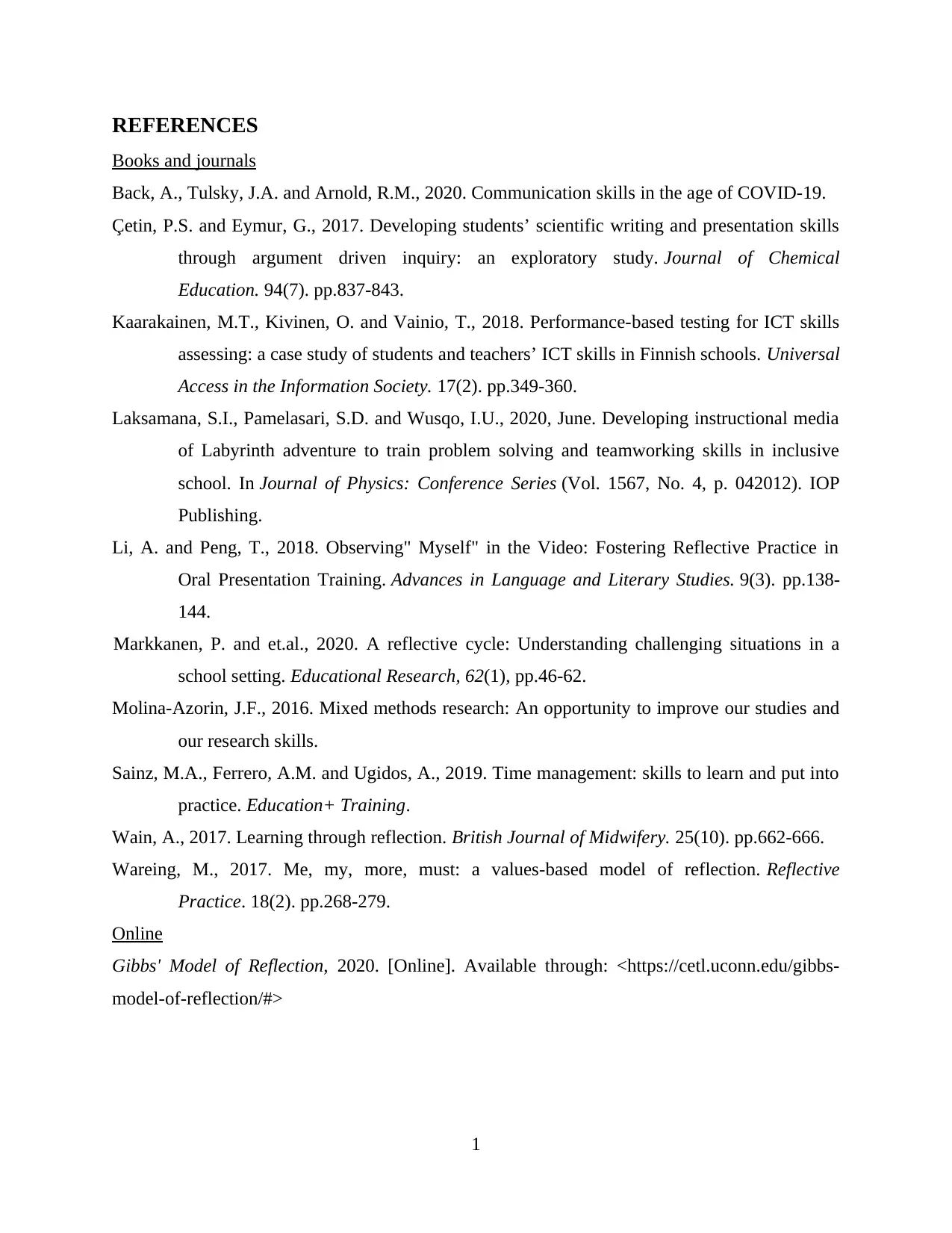
REFERENCES
Books and journals
Back, A., Tulsky, J.A. and Arnold, R.M., 2020. Communication skills in the age of COVID-19.Ç
etin, P.S. and Eymur, G., 2017. Developing students’ scientific writing and presentation skills
through argument driven inquiry: an exploratory study. Journal of Chemical
Education. 94(7). pp.837-843.
Kaarakainen, M.T., Kivinen, O. and Vainio, T., 2018. Performance-based testing for ICT skills
assessing: a case study of students and teachers’ ICT skills in Finnish schools. Universal
Access in the Information Society. 17(2). pp.349-360.
Laksamana, S.I., Pamelasari, S.D. and Wusqo, I.U., 2020, June. Developing instructional media
of Labyrinth adventure to train problem solving and teamworking skills in inclusive
school. In Journal of Physics: Conference Series (Vol. 1567, No. 4, p. 042012). IOP
Publishing.
Li, A. and Peng, T., 2018. Observing" Myself" in the Video: Fostering Reflective Practice in
Oral Presentation Training. Advances in Language and Literary Studies. 9(3). pp.138-
144.
Markkanen, P. and et.al., 2020. A reflective cycle: Understanding challenging situations in a
school setting. Educational Research, 62(1), pp.46-62.
Molina-Azorin, J.F., 2016. Mixed methods research: An opportunity to improve our studies and
our research skills.
Sainz, M.A., Ferrero, A.M. and Ugidos, A., 2019. Time management: skills to learn and put into
practice. Education+ Training.
Wain, A., 2017. Learning through reflection. British Journal of Midwifery. 25(10). pp.662-666.
Wareing, M., 2017. Me, my, more, must: a values-based model of reflection. Reflective
Practice. 18(2). pp.268-279.
Online
Gibbs' Model of Reflection, 2020. [Online]. Available through: <https://cetl.uconn.edu/gibbs-
model-of-reflection/#>
1
Books and journals
Back, A., Tulsky, J.A. and Arnold, R.M., 2020. Communication skills in the age of COVID-19.Ç
etin, P.S. and Eymur, G., 2017. Developing students’ scientific writing and presentation skills
through argument driven inquiry: an exploratory study. Journal of Chemical
Education. 94(7). pp.837-843.
Kaarakainen, M.T., Kivinen, O. and Vainio, T., 2018. Performance-based testing for ICT skills
assessing: a case study of students and teachers’ ICT skills in Finnish schools. Universal
Access in the Information Society. 17(2). pp.349-360.
Laksamana, S.I., Pamelasari, S.D. and Wusqo, I.U., 2020, June. Developing instructional media
of Labyrinth adventure to train problem solving and teamworking skills in inclusive
school. In Journal of Physics: Conference Series (Vol. 1567, No. 4, p. 042012). IOP
Publishing.
Li, A. and Peng, T., 2018. Observing" Myself" in the Video: Fostering Reflective Practice in
Oral Presentation Training. Advances in Language and Literary Studies. 9(3). pp.138-
144.
Markkanen, P. and et.al., 2020. A reflective cycle: Understanding challenging situations in a
school setting. Educational Research, 62(1), pp.46-62.
Molina-Azorin, J.F., 2016. Mixed methods research: An opportunity to improve our studies and
our research skills.
Sainz, M.A., Ferrero, A.M. and Ugidos, A., 2019. Time management: skills to learn and put into
practice. Education+ Training.
Wain, A., 2017. Learning through reflection. British Journal of Midwifery. 25(10). pp.662-666.
Wareing, M., 2017. Me, my, more, must: a values-based model of reflection. Reflective
Practice. 18(2). pp.268-279.
Online
Gibbs' Model of Reflection, 2020. [Online]. Available through: <https://cetl.uconn.edu/gibbs-
model-of-reflection/#>
1
1 out of 8
Related Documents
Your All-in-One AI-Powered Toolkit for Academic Success.
+13062052269
info@desklib.com
Available 24*7 on WhatsApp / Email
![[object Object]](/_next/static/media/star-bottom.7253800d.svg)
Unlock your academic potential
Copyright © 2020–2026 A2Z Services. All Rights Reserved. Developed and managed by ZUCOL.




